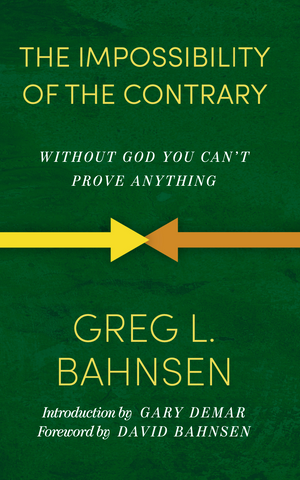Gary answers two listener questions, one about the Bible itself and another about sovereign citizenship.
We do not defend the Christian faith as a series of separate propositions. We defend the whole package. Men are in sin. God in His grace has pursued man and has provided a revelation of himself. And what we are defending is the entire Bible. There is no way around it. And in the Bible, Jesus is presented as the very Son of God, as God himself.
In a sense, we want to throw the question back on the unbeliever. How can you say that there is a God? How do you know there is a God if you don’t know it through Jesus? If you accept the Bible, how can you do that and not accept the deity of Jesus, which is so plain on the pages of Scripture?
The unbeliever is being arbitrary. That may not be obvious at first but look at the way he poses his question. The unbeliever wants you to approach things one by one. The idea that we accept beliefs one by one, coming to them singularly, is pervasive and it needs to be exploded. The beliefs that people hold are always connected to other beliefs by relations about linguistic meaning, logical order, evidential dependence, causal explanation, lexical connection, and self-conception. Understand that the beliefs we hold are always connected to other beliefs.
Let’s take somebody who says, “I see a ladybug on the rose.” That looks like the sort of thing you can accept or reject all by itself. But the person who says “I see a ladybug on the rose” is affirming and assuming not just one proposition but a whole slew of propositions, many things simultaneously. Some of those things will be rather obvious. For instance, to say “I see a ladybug on the rose” assumes the meaning of certain English words. It also assumes something about one’s personal identity (“I”). It assumes something about perception and also some things about the categories of bugs and flowers and physical relations and so forth.
But there are still other assumptions that are also contained in “I see a ladybug on the rose.” There are much more subtle assumptions about one’s linguistic competence, entomological competence, botanical competence, the normalcy of one’s brainstem, theories of light refraction, shared grammar, shared semantics, the reality of the external world, the laws of logic, and on and on.
All of these beliefs together—the network of them—encounters the tribunal of our sense experience. When a conflict is detected between this network of beliefs and our sense experience, we realize that an adjustment must be made to our beliefs to restore consistency. But you cannot determine in advance which of those beliefs someone will give up when a conflict arises.

The Impossibility of the Contrary
Those who deny God have no way to account for the uniformity of nature and its laws. Natural man does have knowledge, but it is borrowed knowledge, stolen from the Christian-theistic pasture or range, yet natural man has no knowledge, because in terms of his principle the ultimacy of his thinking, he can have none, and the knowledge he possesses is not truly his own. The natural man has valid knowledge only as a thief possesses goods.
Buy NowGary answers two listener questions, one about the Bible itself and another about sovereign citizenship. People regularly claim that the Bible is a “religious” book, but unlike every other religious book the Bible roots itself in actual history. Dismissing the Bible as a religious work is special pleading that happens with no other works of history.

